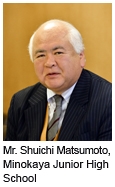2015

(Posted Oct. 2015)
Educational Opportunities for Children Key to Our Future
 Mr. Shuichi Matsumoto: At my junior high school, we put a lot of effort into sports promotion. In recent years, we've had success in soccer, badminton, baseball, long-distance running relays and other sports, with our athletes taking part in prefectural and national tournaments. I know that Minebea has an accomplished long-distance running team, and it would be a great encouragement to us to have the team members interact with and give advice to us in sports so that we could aim higher. Also, our second-year students visit many companies to get hands-on work experience, and we would appreciate your cooperation here, too. It would be very beneficial to have your employees talk about their work at the company so that our students could think seriously about what they want to do in the future.
Mr. Shuichi Matsumoto: At my junior high school, we put a lot of effort into sports promotion. In recent years, we've had success in soccer, badminton, baseball, long-distance running relays and other sports, with our athletes taking part in prefectural and national tournaments. I know that Minebea has an accomplished long-distance running team, and it would be a great encouragement to us to have the team members interact with and give advice to us in sports so that we could aim higher. Also, our second-year students visit many companies to get hands-on work experience, and we would appreciate your cooperation here, too. It would be very beneficial to have your employees talk about their work at the company so that our students could think seriously about what they want to do in the future.
Mr. Haruki Kato: Please let us know what we can do and we will positively consider your proposals. We regularly hire local employees from specialized technology high schools, and we have already begun programs to dispatch graduates from the high schools to talk about their work experience with current students.
 Mr. Makoto Kanba: Even at elementary schools, we are making efforts to prepare children for the future through career education. When children become aware that a nearby company is a company with a global presence, it helps nurture a positive interest in work. It might also be interesting for children to develop a global perspective by listening to the experiences of your employees doing business on a global stage.
Mr. Makoto Kanba: Even at elementary schools, we are making efforts to prepare children for the future through career education. When children become aware that a nearby company is a company with a global presence, it helps nurture a positive interest in work. It might also be interesting for children to develop a global perspective by listening to the experiences of your employees doing business on a global stage.
 Mr. Yasuo Tsukada: In addition to school education, we offer social education to a broad group of people at our community center through various seminars. We'd welcome talks from your employees at these venues as well.
Mr. Yasuo Tsukada: In addition to school education, we offer social education to a broad group of people at our community center through various seminars. We'd welcome talks from your employees at these venues as well.
Mr. Haruki Kato: I believe we can help you with these kinds of activities. We have many employees with overseas work experience, and we also regularly have trainees from China, Thailand and other countries working at the plant. In that sense, I believe we could help with cross-cultural education programs.
Mr. Makoto Kanba: Our sixth-grade elementary students have a motor assembly lesson as part of their science curriculum. We'd be pleased to hear about motors from your employees with specialized knowledge of the technology. In addition, we take field trips around the neighborhood each year, and we'd like to visit your plant for a tour as part of the event. For children, a tour around a manufacturing site would be a new experience.
Mr. Haruki Kato: I think that both of these types of children's educational activities are significant, and we will consider how exactly we can cooperate. Regarding plant tours, we have regulations to ensure the protection of confidential business information, but we can select areas of the plant which do not pose problems for educational visits, and therefore I don't anticipate any problem. We will arrange the procedures internally to support your visit.
Mr. Kei Matsumoto: Having children learn that there is a company in their community with a proud global legacy will foster pride among the children in their community.














